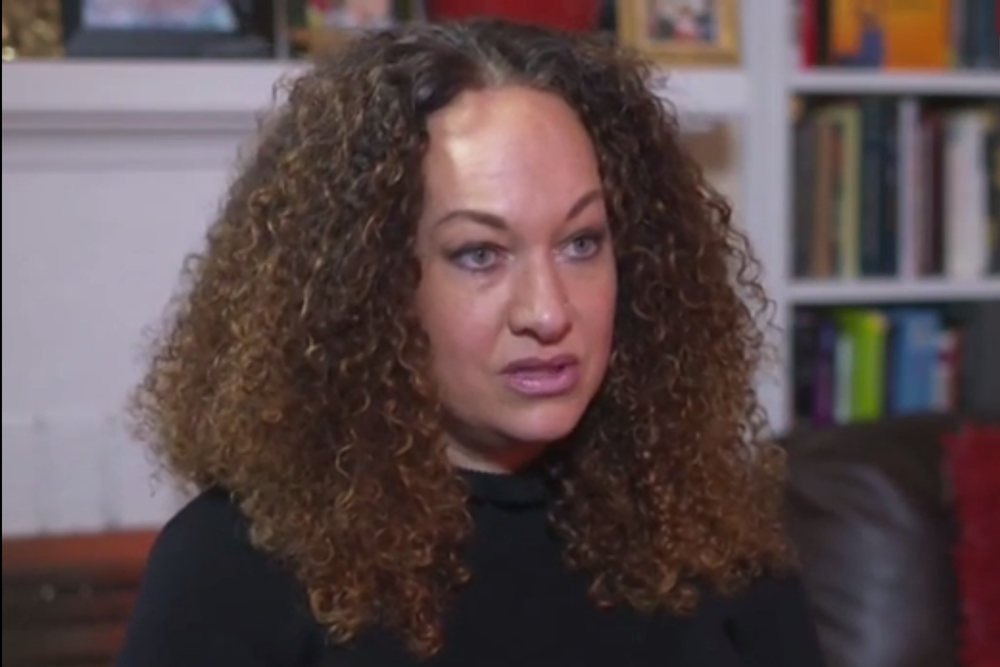Rachel Dolezal, now legally known as Nkechi Amare Diallo, starts her memoir with a flagrant heavy-handedness. In Full Color: Finding My Place in a Black and White World is preluded by a poem from Harlem Renaissance laureate Langston Hughes. The second chapter of the book is named “Escaping to Africa (in My Head),” in which she details her early dalliances with blackness. She remembers coloring portraits of herself with a brown crayon because “peach simply didn’t resonate with me,” and how she’d make herself look like the African women who appeared on National Geographic, making “soupy mud, which I would then rub on my hands, arms, feet, and legs, as if applying a lotion.” When she recalls the first time she met a black person, who “seemed like a king,” it feels like the beginning of her confusion of fantasy and identification, a distinction she is unable to make throughout a memoir that is an attempt at justifying her identity rather than explaining it.
Dolezal recalls a childhood damaged by frequent abuse from her religious zealot parents, who justified beating her by saying, as Dolezal writes, “If you’re having fun, you’re sinning.” She uses this sort of religion-driven debasement to tie herself to blackness, relaying that as the child with the darkest skin tone in her immediate family, she saw herself in the Old Testament story of Noah’s son Ham, whose descendants were cursed after he saw his father drunk and naked. Because “Ham” has been erroneously translated as “black” by some interpreters, many think that story’s damnation extends to African-Americans. That such a dramatically overwrought tale appears a few pages into the memoir is telling. She both predicates her blackness on a sense of tainted otherness, and looks for connections to black people where they don’t exist.
In Full Color is a linear biography that follows Dolezal from her upbringing as a white child in Montana to being exposed for pretending to be black while serving as an NAACP chapter president in Spokane, Wash. in 2015. Her life story is presented as a defense for failing to answer “Are you African-American?” with a “yes” or “no” in the local news interview that propelled her into viral infamy. But she seems sure of the answer these days. In her current press run, the 39-year-old civil rights activist has maintained that she identifies as black, clinging on to blackness even as interviewers correctly note that she could ally herself with Black issues without saying she’s a member of the community. That’s what made the Dolezal case offensive—not practicing black activism while being white, but conflating a chosen struggle with a borne one.
Written in plainspoken prose, In Full Color threads through trauma suffered by her black siblings, who were adopted, at the hands of her family. Her adopted sister was sexually abused by her biological brother, and her adopted brothers were also beaten by her parents. She writes of a sexual assault that happened to her during a trip to San Francisco, and her fall into joblessness following the racial outing. By the memoir’s end, she uses those experiences to argue that Rachel the Black Woman isn’t a performative character. “Because people observe me through the same distorted lens they use to look at the notion of race in general, they’re unable to see my true essence, just like they’re unable to grasp that race is a myth, a charade,” she writes in her attempt at a messianic closing thesis.
This logic quickly falls apart even as Dolezal recognizes race as a social construct. Her self-identification as a black woman also reads tenuously because it’s a link she initially makes through a myopic lens, explaining at the beginning of the book that her kinship with black people stems from the alienation she felt as a child. Dolezal further attempts to ground herself in the culture via her relationship with her two sons (one of whom is biracial) and her adopted siblings (who are black), as well as the principle that Africa birthed humankind. And yet, her writing lacks the empathy required to sell herself as, in her words, “a fully conscious, woke soul sista.”In Full Color often devolves into using basic sociological concepts (do you know what a “microaggression” is?) to examine blackness as some sort of mechanism to be deconstructed. Nearly every attempt to humanize the culture is centered around her—which makes sense for a memoir, but not so much when you remember that this specific memoir exists because a white woman is still trying to legitimize her blackness. Against anecdotes like her childhood fantasies of being an African princess, Dolezal’s fascination with blackness too often read as escapist therapy. The supposed “transracialism” isn’t an identity, but a cloth to cover trauma.
Dolezal posits her personal cultural revelations as if they’re novel. She presents the “race is a social construct” argument as if she’s ripping the cloak off some hidden truth. That concept may be new to disengaged white folks who find Dolezal’s book revelatory, but it’s the accepted reality for the community in which Dolezal is trying to gain membership. In trying to justify her blackness, Dolezal remains as close to white people as ever. Because black people have been severed from the motherland, we’ve been forced to craft an identity whilst tangled with America’s whiteness. Inverting that truth for an ultimately self-serving defense is a Caucasian act.





